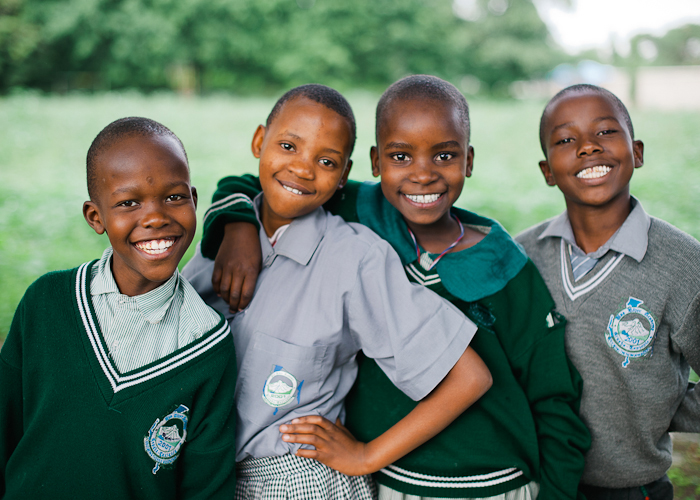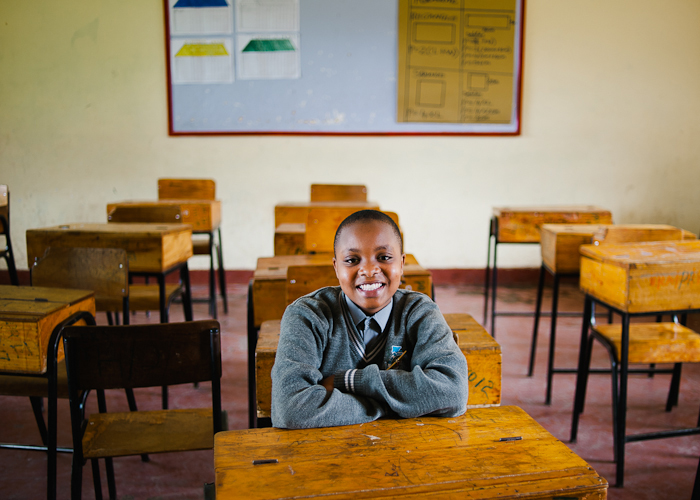When we talk about the Tanzanian school system people frequently ask us, “what is Class 4? What is Form 2? How does the Tanzanian school system work compared to the U.S. schools?” We hope this detailed post will help clarify all of this for you!
The Tanzanian school year typically runs with the calendar year (starting a new school year in January and ending in December). Tanzanian education is separated into three main levels: primary, secondary, and tertiary. Primary best equates to elementary and middle school; secondary is most similar to high school; and tertiary is for continuing studies before university. Primary school starts out with two years of pre-primary education called baby class. This is much like preschool and kindergarten. From there students go through class 1 – 7 (grades 1 -7 in the U.S.). TFFT is committed to providing support for our scholarship students from baby class all the way through tertiary education.
In primary school all children are take the following subjects: Math, English, Kiswahili, Science, and Social Studies (which includes concepts from Geography, History, Civics, and Life Skills).
Like in the U.S., both public and private schools exist. Private schools are typically English-medium (taught in English). Public schools are referred to as government schools, which are taught in Kiswahili. Government schools are free to students to attend, but students are sill required to purchase uniforms, books, schools supplies etc., which makes attending school cost prohibitive for many children.
In class 4 and class 7, all students are required to take a national exam before they can continue to the next level. The student’s results from the class 7 national exam determine whether he or she is able to progress on to secondary school. If you are in government schools, to be accepted in a government secondary school you must score at least 100 points out of 250 points. If you pass the exam, you are placed in a government secondary school; however, all students must pay tuition to attend secondary school, even if it is a government school. Passing the exam and affording secondary school tuition are both barriers for students hoping to receive secondary (high school) education.
Private English-medium secondary school is also an option, and any student (regardless of exam scores) can attend private secondary school if they are able to pay. This, however, is reserved for middle to high income families. All of the TFFT Scholarship Students attend private English-medium boarding schools for their primary and secondary education.
Secondary school is broken down into O-Levels and A-Levels. O-Levels (also called junior secondary) is Form 1-4. This is the equivalent of America’s eighth grade – junior year of high school. During O-Levels students narrow their focus and choose to take a combination of subjects. Different combinations are Science (physics, chemistry, biology), Arts (geography, Kiswahili, English), Business (commerce and bookkeeping). Regardless of their focus, all students take math, biology, and physics.
Once in Form 4, students in both private and government schools are required to take a national exam that determines if a student can continue on to A-Levels (also known as senior secondary) which consists of Form 5 and Form 6. To get into an A-Level program, you need passing exam grades in at least three subjects (higher than 41%). A=81-100%, B=61-81%, C=41-60%, D=21-40%, F=0-20%.
If a student gets high marks on their Form 4 national exam, they are accepted to attend A-Level programs for an even more narrowed focus of study. Combinations are HKL (History, Kiswahili, and English Language), HGL (History, Geography, and English Language), HGE (History, Geography, and Economics), EGM (Economics, Geography, and Math), ECA (Economics, Commerce, and Accountancy), PCB (Physics, Chemistry, and Biology), PCM (Physics, Chemistry, and Math), and PGM (Physics, Geography, and Math). Following A-Levels students may apply for university to earn their degree.
If a student does not earn passing grades or get top marks on the Form 4 National Exam, the options for further education are either two-year college to receive a diploma (similar to community college) or a certificate level course. Once a student has finished this they still have the opportunity to apply for university to receive their BA or BS, so a student does not necessarily have to do A-Levels to get to university.
While our hope is for our students to qualify for A-Levels, currently many of our older students have had less time with TFFT’s guidance; therefore, we have found that rather than taking an A-Level course they do not like or one that isn’t very impressive, 2 year college is a great option for them than. In the future, we expect that students who have been with TFFT since baby class (or early in their primary education) will be fully prepared to excel in A-Levels and university.
Currently we have one student in an accounting college and three in a tourism college. This year we have 4 students taking their Form 4 National Exams. The big mock exams are quickly approaching, and they have extra tutoring in preparation. They are shortening their holiday break to come back to school to study. One thing all of our kids have is a great work ethic, and we’re pleased to see them all try their very best.
Ombeni, pictured below, is in his first year of tourism college. came to visit Usa River Academy during Academic Progress Day, and all the primary and secondary students were eager to see him and ask him questions about his studies.
Hope this helps clarify things. Let us know if you have any other questions!






